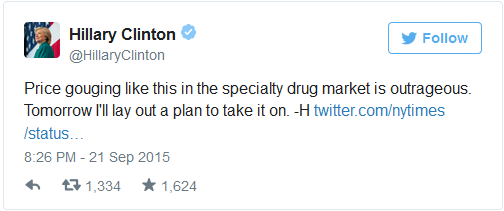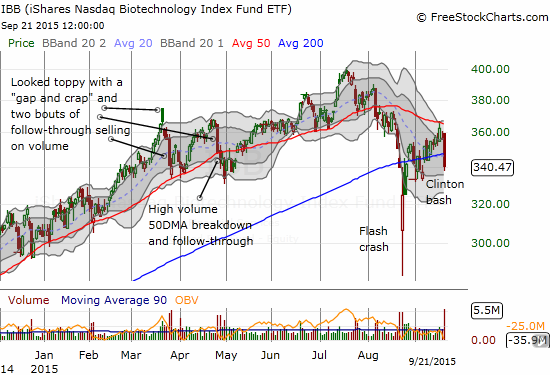The shot was heard around the world of biotech yesterday:

The reaction was immediate and sharp for iShares NASDAQ Biotechnology Fund (NASDAQ:IBB) as it lost 4.6% on the day on trading volume nearly 3x the 3-month average.
Hillary Clinton’s tweet was enough to take down iShares Nasdaq Biotechnology (IBB). However, IBB has proven very resilient in the face of earlier strong selling pressures.
I doubt many of the quick trigger fingers bothered to read the NY Times article that was the source of Clinton’s outrage. Here are some of the key paragraphs from the beginning of the article:
“Specialists in infectious disease are protesting a gigantic overnight increase in the price of a 62-year-old drug that is the standard of care for treating a life-threatening parasitic infection.
The drug, called Daraprim, was acquired in August by Turing Pharmaceuticals, a start-up run by a former hedge fund manager. Turing immediately raised the price to $750 a tablet from $13.50, bringing the annual cost of treatment for some patients to hundreds of thousands of dollars…
Turing’s price increase is not an isolated example. While most of the attention on pharmaceutical prices has been on new drugs for diseases like cancer, hepatitis C and high cholesterol, there is also growing concern about huge price increases on older drugs, some of them generic, that have long been mainstays of treatment…
Although some price increases have been caused by shortages, others have resulted from a business strategy of buying old neglected drugs and turning them into high-priced “specialty drugs.”
Missing from the article was a specific quantification of the scale of the problem, the cost to the health care system, and/or an estimate of excess profits made by the industry. The article was mainly focused on specific cases of egregious price hikes and a fascinating examination of the background of Martin Shkreli, the founder and chief executive of Turing. Ironically, the article also note that two members of Congress wrote a letter in August to Valeant Pharmaceuticals (NYSE:VRX) to investigate sharp price hikes on two recently acquired heart medications. One of those Congressmen, independent Vermont Senator Bernie Sanders, is fiercely competing with Clinton for nomination from the Democratic party for President. Is it possible that Clinton is moving quickly to prevent Sanders from getting all the credit for going after evil drug companies?
None of these gaps and intricacies matter for now as sellers seek to get out first and ask questions later. If I traded this special situation, I would stand ready to buy as soon as Clinton announced/released her plan (hopefully her plan at least fills in some of the gaps left by the article). The buy the news strategy gets more tempting the deeper the selling going into Clinton’s announcement.
Certainly, risks to IBB have increased some unknown amount and perhaps IBB deserves to lose some of its premium. However, given the main business model of IBB-constituent companies is NOT price gouging, Clinton’s sabre-rattling could very well end up tangential to IBB’s prospects.
Moreover, there are multiple layers of uncertainty ahead: Clinton wins the Democratic nomination (maybe a Sanders nomination has the same impact for drug companies, but theoretically the market already got a chance to panic about the odds of a Sanders victory), Clinton wins the Presidency, Clinton gets Congress to pass a related bill, said bill survives a battery of legal challenges. In other words, there are many, many years between now and the time that we could even have a hope of knowing whether any kind of related regulation descends upon IBB. The present value of this uncertainty is probably just about zero. Thus, buying IBB on a bet that Clinton-related losses will eventually reverse seems like a good risk/reward bet.
Note also the past resiliency of IBB to past selling. From a technical perspective, IBB SHOULD have topped out already. Monday’s high-volume selling (September 21, 2015) confirmed the 50-day moving average (DMA) as resistance and cracked the even more important 200DMA. The current close is just the third lowest close since the flash crash. In other words, the technical stakes are VERY high here…
Full disclosure: no positions
